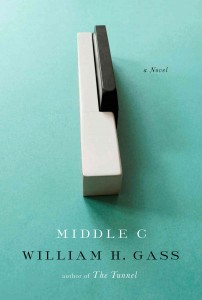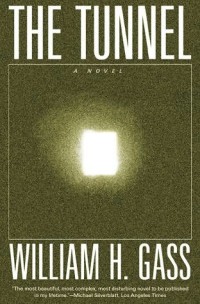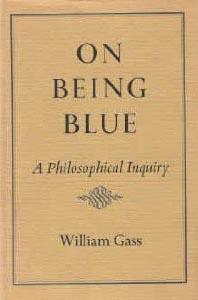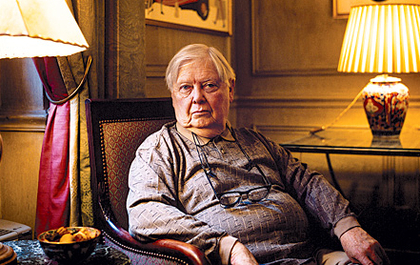On Identity in William Gass’s Middle C
 Middle C
Middle C
by William Gass
Knopf, March 2013
416 pages / $28.95 Buy from Amazon
In a recent interview with the Los Angeles review of Books, William Gass cited a fellow titan of high postmodernism when asked about the role of obsession in his fiction. “[William] Gaddis maintained that the writer needed an obsession; he or she would then worry about it like a cat with a rag. The obsession may be hard to spot and it took me some time to discover mine: the stupidity of mankind, its misuse of reason.”
If the common thread of Gass’s fiction has ever been too translucent or opaque to put your finger on, with that sentence he gave us the decoder key to his entire oeuvre.
And where do human beings misuse their reason more than in regard their own self-image? This is the question that Gass chooses to plumb in Middle C, just the third full-length novel of his otherwise prolific career.
Middle C, in the makings for a decade and a half, comes along at a time when neuroscience is probing more and more deeply (and for some, uncomfortably) at the question of what exactly makes us us. Experimental psychologist and author Bruce Hood opined in his 2012 book, The Self Illusion, “If we are so susceptible to group pressure, subtle priming cues, stereotyping and culturally cuing, then the notion of a true, unyielding ego self cannot be sustained. If it is a self that flinches and bends with tiny changes in circumstances, then it might as well be non-existent.”
And it’s hard to argue. We are funny creatures that, largely through trial and error in testing social boundaries, concoct these permanent-if-illusory entities we like to call selves, ideas which are only further hardened whenever they are challenged by evidence of their amorphousness. Or, as it’s elegantly put with regard to our protagonist, “In Joey’s case, ignorance encouraged certainty.”
But before we ever meet Joey, aka Professor Joseph Skizzen, we are introduced to his father, an Austrian patriarch named Rudi Skizzen who decides to give he and his family new, Jewish identities in order to escape the advancing Nazis and gain asylum in England, where Joseph is born as Yussel Fixel. Of course, all along we have the sneaking suspicion that Rudi is less concerned with his family’s safety or complicity in the atrocities to come, and more ashamed of — or maybe even just bored of — his Austrianness.
In England, with wartime sympathy for the refugee class waning, Rudi reinvents himself once again as janitor and gambling man Raymond Scofield, before his ultimate dematerialization, leaving his family behind and, we’re lead to believe, making off for the New World
The story then picks up in Ulrichstown, Ohio with Joseph, who, right from adolescence, seems uncomfortable as a member of the human race. As he would express as a more articulate — and equally rancorous — adult, “the desires that men displayed, either alone, at social clubs, in political parties, or as communities, leagues, and nations, were fundamentally so measly and uninteresting, and the methods employed to achieve them so borrowed, makeshift, and inadequate, that what was eventually obtained was a shambles, leaving their suitors dissatisfied, angry, and searching for more satisfactory targets.”
Still, in a fit of irony, Joseph discovered something he did want to be: Austrian. And an educated Austrian he would become. Using his imagined Austrian upbringing and a love for “difficult” modern music to boost his air of superiority, Joseph lucks and feigns his way into a position as Professor of Modern Music at the tiny, austere Whittlebauer College, a position for which he is, er, under qualified for, by some measure.
September 13th, 2013 / 11:05 am
25 Points: The Tunnel
 The Tunnel
The Tunnel
by William Gass
Dalkey Archive Press, 2007
652 pages / $15.95 buy from Dalkey Archive Press or Amazon
1. It took the man 26 years to write this thing. Let’s just get that out of the way now.
2. Semi-autobiographical, with an ornate use of language, penis obsessed, full of stupid limericks about horny nuns. It’s in the vein of Joyce and Pynchon but maybe not as annoying, not as smug–though maybe I’m wrong about that.
3. I did find the book unusually satisfying. Just sitting down and reading Gass’s prose out loud is really enjoyable: rhyming and alliteration are present at all points but Gass weaves the sounds into the thought and plot without being gratuitous. He does it joyously, gallopingly. He moves things along at a decent pace and lets you feel every increment.
4. The narrator William Kohler is a terrible person who you learn to love. He’s a fascist, misogynist, grumpy fat old fuck and you get to see inside his head and understand why he is all of these things. If you are the sort of person whose life can be changed by books this may change you so you can appreciate the shittiest people on this planet.
5. Plot is minimal. If anything “happens” it is the digging of the eponymous tunnel though that whole part is really pretty minor anyways. The majority of the book follows Kohler examining his childhood, his education, his marriage, family, coworkers and anger. Always the anger, the disappointment.
6. Kohler has two kids. Throughout the book he can only remember one of their names. Genius.
7. The descriptions are, without a doubt, beautiful. Candy, flowers, interiors, and people especially. Gass builds the characters up from thousands of scraps, always describing over and over, adding and sticking on and plugging holes. The characters come off as straddling an incredibly thin line between being fully developed and total caricatures. It works because we are inside Kohler’s head the whole time, and don’t you always caricature those you are forced to be around?
8. Degenerative sickness strikes a number of those around Kohler. Those he loves and hates. These depictions are gut wrenching and we get to see the characters before and during, before and during, before and during their declines. Seeing Kohler’s brilliant mentor go through sickness then back to health is particularly rough for we know that soon enough he will be back on the sick bed twitching and jerking. It’s like Gass gives them a reprieve just so he can suck them back through their crumbling one more time.
9. There is this depiction of academic life toward the beginning of the book which (though never having lived it myself) seems entirely appropriate: “Life in a Chair.” Kohler looks back and realizes he’s spent his entire life just sitting, reading, sometimes looking out a window. He never succumbs to sadness or regret, just puts it out as a solid fact and meditates on it to great length. This section should be read by anyone who wants to go into academia I think.
10. There are few people in Kohler’s life who are not totally insane. READ MORE >
May 28th, 2013 / 5:01 pm
The Weave and Werve of Words in William Gass’s On Being Blue: A Philosophical Inquiry
 On Being Blue: A Philosophical Inquiry
On Being Blue: A Philosophical Inquiry
by William Gass
D. R. Godine, 1975 / 1991
91 pages / Buy from Amazon (1975 ed / 1991 ed)
Monday is a good day to think about William Gass’s On Being Blue because Mondays often are. The color blue, Gass’s muse, is, in this slim book, organized, discussed, described, pondered, and psychoanalyzed; the first page is a list of just a few things that could be blue—stockings, movies, laws—and the last page is a fading away, these wild words all we have left, as “everything is gray.” From blue to gray to yellow and green and wherever in between, On Being Blue is a hopscotch around the rainbow. It infects you with synesthesia. There’s the “disapproving purse to pink”, “violet’s rapid sexual shudder,” and “the rolled-down sound in brown.” There are also lots of curse words and fucking.
(Some form of the word blue appears 412 times, according to my count.)
Not only fucking, there’s also “ficking,” “facking,” and “focking.” Blue is the color of obscenity-laced literature and balls. It’s a portal into the sexual, a catch-all color that captures the deliciously libertine, our deviant wants and protruding desires that in fiction are titillations of the imagination provoked through language. Gass turns sex into linguistic gymnastics, so he fascinates us with “not lips and nipples, but nouns and verbs.” Beautiful language is, to Gass, a great aphrodisiac. He quotes verse by Sir John Suckling and a scene from The Lime Twig. He pokes around Gertrude Stein’s Tender Buttons.
November 12th, 2012 / 12:00 pm
Paragraphs That Make Me Warm (6): William Gass

Now the horse was quiet and we were breathing careful and if the wind had picked up we couldn’t hear it or any snow it drove. It was warmer in the barn and the little light there was was soft on hay and wood. We were safe from the sun and it felt good to use the eyes on quiet tools and leather. I leaned like Hans against the wall and put my gun in my belt. It felt good to have emptied that hand. My face burned and I was very drowsy. I could dig a hole in the hay. Even if there were rats, I would sleep with them in it. Everything was still in the barn. Tools and harness hung from the walls, and pails and bags and burlap rested on the floor. Nothing shifted in the straw or moved in hay. The horse stood easy. And Hans and I rested up against the wall, Hans sucking in his breath and holding it, and we waited for Pa, who didn’t make a sound. Only the line of sun that snuck under him and lay along the floor and came up white and dangerous to the pail seemed a living thing.
– from ‘The Pedersen Kid’ in In the Heart of the Heart of the Country, pg. 60
